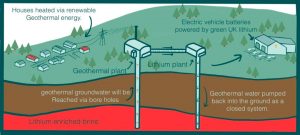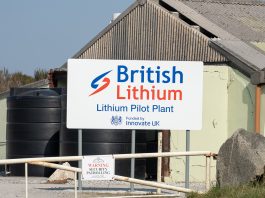Eileen Maes, Public Affairs & Communications Associate at the Critical Minerals Association, discusses the UK’s recent innovations in lithium and how these will transform the sector.
If someone were to say ‘lithium’, what would you expect to hear next? Most would expect the word ‘battery’.
Images would come to mind of electric vehicles (EVs), the energy transition, and the emerging electrification of society. Some visualise the ‘Lithium Triangle’ situated in the intersecting borders of Bolivia, Chile, and Argentina; some think of Australia; others imagine the United States and Tesla, their glamorous super-cars and impressive gigafactories.
Very few would consider the islands of the United Kingdom. But they should – and more and more are.
The race for critical minerals
China currently dominates the refining sector of the lithium supply chain. In fact, it dominates the refining component of many critical mineral supply chains.
Critical minerals are essential resources for manufacturing modern and renewable technologies: mobile phones, computers, banknotes, solar panels, wind turbines, EVs, aerospace and medical applications, the list goes on. They are, therefore, vital to economic health and national security.
What makes them ‘critical’ is that their supply can easily be disrupted, for a range of reasons: market immaturity, conflict, social unrest, natural disasters, geological scarcity, and one risk we are now intimately knowledgeable of – pandemics and their impacts on global supply chains.
Companies all around the world rely on China for their supply of refined lithium to manufacture a wide range of products, from disposable vapes to EV batteries. The UK, along with other western and like-minded nations, want to reduce this dependency. The Russian invasion of Ukraine, COVID-19, and other geopolitical tensions and market shocks have exacerbated power polarity in the last few years and exposed the vulnerabilities in our international supply chains.
The matter of Taiwan, for instance, is of significant import. The island produces 60% of the world’s semiconductors and 90% of the world’s most advanced semiconductors. These computer chips (composed of critical minerals) are responsible for powering our smartphones, computers, and Artificial Intelligence (AI). But what would happen if China controlled the world’s supply of semiconductors? What would it mean for Western nations and their technological goals, including net zero?
No wonder, then, that there is increasing government interest in developing alternative, responsible, and resilient supply chains for critical minerals such as lithium. But how does the UK, which possesses little operating mining infrastructure and only one operating gigafactory (which is Chinese-owned), insert itself into the lithium value chain?
Pioneering sustainable innovation
The UK is fortunate to host some of the lithium industry’s most innovative projects.
Green Lithium is a UK company in the process of establishing one of Europe’s first merchant lithium refineries. Stationed in Teesside, their location and the advantage of the UK’s freeports will enable them to supply battery-grade lithium chemicals to Europe’s growing manufacturing industries.
Funded by the Automotive Transformative Fund – set up by the Advanced Propulsion Centre (APC UK) in collaboration with the UK Government – Green Lithium is a vital part of the nation’s Critical Minerals Strategy that aims to make the UK less dependent on Chinese exports.
Cornish Lithium, a mineral exploration and development company based in Cornwall, is another important piece of the UK’s strategy. Its portfolio includes advanced projects such as the Trelavour hard rock lithium project, and it recently announced significant progress towards the commercialisation of its Lithium in Geothermal Waters projects, with an exploration borehole successfully drilled at Twelveheads and a fourth borehole being drilled at its Blackwater site.
Partnering with a consortium of academic and industry partners (Satellite Applications Catapult, Camborne School of Mines, Terrabotics, Decision Lab, British Geological Survey, Pixalytics, and CGG), its project Satellite for Batteries aims to understand how Machine Learning and automating processes, specifically the interpretation of satellite imagery, can be utilised to define prospecting targets for lithium. The project was funded by the UK Space Agency under the National Space Innovation Programme.
In 2019, Cornish Lithium and 3DeepMedia also received funding from the European Regional Development Fund to undertake a drone survey, mapping geological faults on the north coast of Cornwall that are believed to host lithium-enriched geothermal waters at depth. The captured photogrammetric data was translated into a 3D digital model rendering of the coast, enabling Cornish Lithium to obtain high-resolution imagery in a time-efficient and environmentally conscious way.
Cornish Lithium does not only pioneer innovative sustainability in the prospective phase but also the extractive phase. Their Blackwater project aims to demonstrate Cornwall’s potential to produce lithium from geothermal waters.
UK companies such as Cornish Lithium and Weardale Lithium are working to pioneer methods of Direct Lithium Extraction (DLE) that are sustainable, low-impact, and commercially viable.
Direct Lithium Extraction
In May 2023, Weardale Lithium successfully extracted lithium from geothermal brines located in County Durham and produced a sample of lithium carbonate using DLE technology. They employed their propriety Direct Lithium Extraction and Crystallisation (DLEC™) process, which selectively removes lithium ions from complex brines using mixed matrix hollow fibre absorption membranes, followed by concentration, polishing, and crystallisation stages.
DLE is one of the latest trends to emerge in lithium extraction. Fig. 1 showcases how geothermal groundwater is pumped to a plant via drilled boreholes, where lithium is then extracted from the mineral-rich brine through several chemical processes. DLE is a low-impact, low water-usage, low-waste approach to lithium extraction. The small diameter of the boreholes ensures that the project’s environmental impact is minimal, and waste is drastically reduced since groundwater is recirculated back into the ground as a closed system.

DLE is a particularly exciting sphere in the lithium sector since it’s such a stellar example of sustainable innovation, and would widen rather than steepen lithium’s projected cost curve.
The milestone has enabled Weardale Lithium to progress its plans to scale up its extraction trials by constructing a DLE pilot demonstration plant in Eastgate for test-scale production of lithium. Targeted commercial production stands at 10,000 tonnes of lithium carbonate per annum. At that scale, Weardale Lithium would generate 125 new jobs and an estimated £1bn in gross economic value for the North East region.
To provide some perspective, the global demand for lithium this year alone was 989,000 metric tonnes, with annual demand projected to increase to over two million metric tonnes by 2030(S&P Global, 2023) . The world will require many more lithium projects to meet global demand.
Lithium in hard rock & mining waste
British Lithium is another company integral to the UK’s Critical Minerals Strategy. In 2021, despite restrictions imposed by the pandemic, British Lithium successfully designed, built, and commissioned the world’s first end-to-end lithium pilot plant treating lithium mica granites that are extensively found in Cornwall.
They were the first company to drill for lithium in the UK; to discover a sizable lithium deposit in the UK; to develop a novel, environmentally friendly process for extracting lithium; and to produce battery-grade lithium from Cornish granite.
British Lithium owns and operates Europe’s only integrated lithium pilot plant, and is planning an integrated quarry, beneficiation plant, and refinery to produce 20,800 tonnes of lithium carbonate per annum on a brownfields site in Cornwall. An independent study compared British Lithium’s proposed development to all existing hard rock lithium mines. It concluded that their carbon intensity per tonne of lithium would be less than half of the next best producer. The project would also recycle all its water streams, requiring virtually zero-net water consumption.
Cornish Lithium’s Trevalour project is also investigating hard rock lithium sources. The site of St Austell Granite used to be an important source of Kaolin (otherwise known as china clay) but their granite deposits also host significant lithium grades (Cornish Lithium, 2023). These projects at British Lithium and Cornish Lithium offer a first glance at the value of extracting lithium from tailings and waste material. Waste is, in fact, not waste at all, but a misunderstood and unappreciated asset containing valuable materials for achieving net zero.

The recycling of disposable vapes, for instance, is a particularly hot topic. At least 1.3 million vapes are thrown away every week in the UK. Most will not be recycled. The consequences are troublesome. Disposable vapes account for littering, plastic pollution, and the squandering of their precious lithium-ion batteries.
In partnership with the Royal Mail and Waste Experts, vape technology provider FEELM launched the world’s first vape recycling scheme in May 2023. The scheme allows customers to return their single-use vapes to a participating store or directly via post. To incentivise use, FEELM will provide a free vape in exchange for every 10 devices deposited. With the UK setting an example, one can anticipate other nations to follow closely behind and begin implementing similar schemes in the coming years.
Looking forward
It’s an exciting time for the UK’s Critical Minerals sector. On 8 June, UK Prime Minister Rishi Sunak and US President Joe Biden signed the Atlantic Declaration, an unprecedented partnership that aims to tackle the biggest economic challenges of our time. The Declaration includes negotiations for a bilateral Critical Minerals Agreement that will see the two nations develop and deepen existing channels of coordination, consultation, research, development, and investment, even potentially making UK companies eligible for US Government funding.
Innovative companies such as Green Lithium, Cornish Lithium, Weardale Lithium, and British Lithium demonstrate that lithium producers can be environmentally conscious at every point in the supply chain, from prospecting to extracting, and refining to recycling. Lithium can and should be manufactured with methods that are low-impact, low-carbon, and involve low-water usage. The mining industry should be devoted to sustainability, working to mitigate climate change rather than contribute to it. But companies must do their part in proving this.
Lithium and other Critical Minerals are essential to bring about the green future we all want. Given the complexity of today’s supply chains, the ceaselessness of technological development, and the inevitability of market shocks, innovation will always have a prized space in the critical mineral value chain. Different battery chemistries, recycling solutions, and energy sources are being explored and tested every day. The UK’s world-leading expertise and innovation will ensure it always has a home in the value chain.









